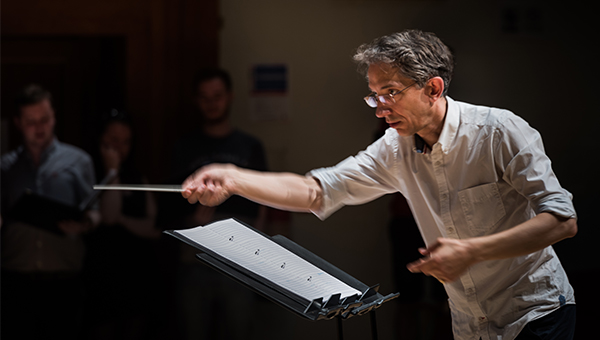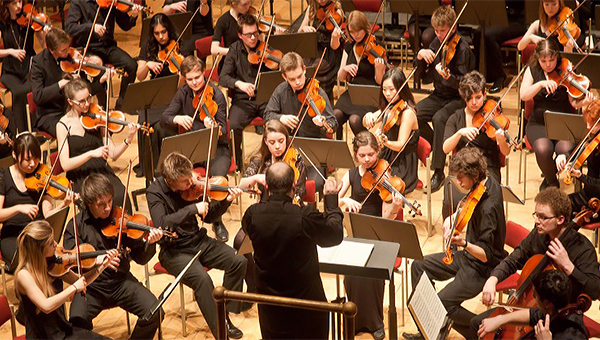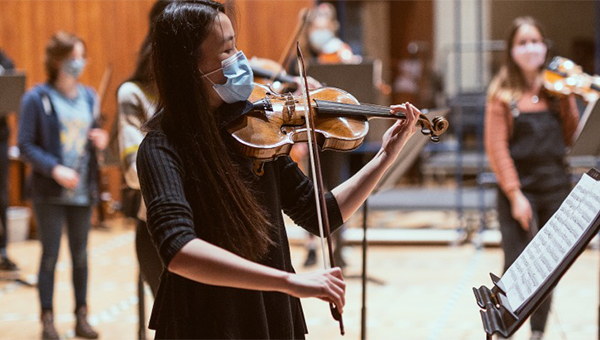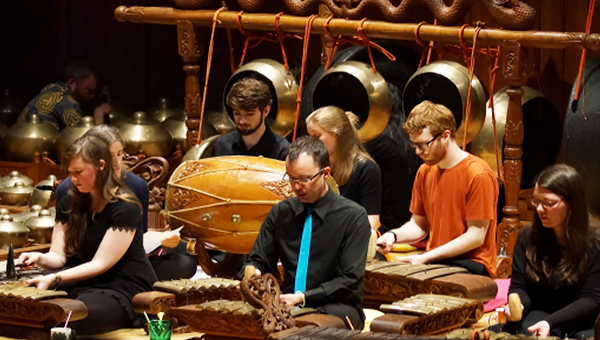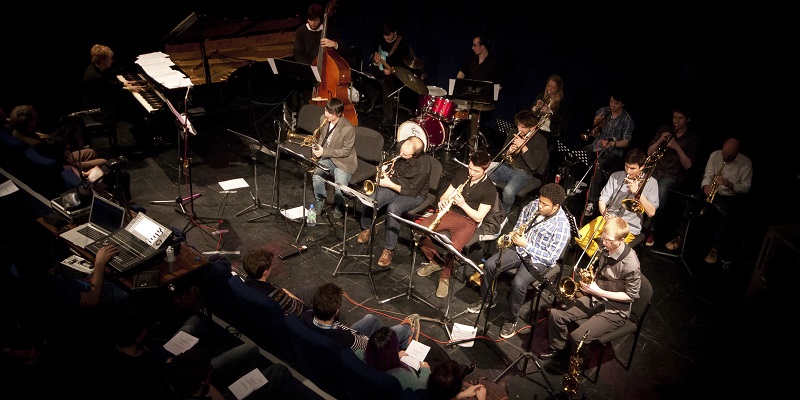
Ensembles
Choral ensembles
University Choir
The University Choir welcomes members from both inside and outside the University and was formed over 50 years ago. The choir aims to provide a cultural hub within York and to collaborate with groups such as the Royal Northern Sinfonia and Yorkshire Baroque Soloists. The choir performs repertoire from the late Baroque period through to the 20th century.
- Musical director: Robert Hollingworth
- Rehearsals times: Monday evenings 7.30pm to 9.30pm during University semester-time
- Rehearsal location: Sir Jack Lyons Concert Hall
- Semester 2 Concert: Central Hall, Saturday 9 May.
- Annual membership cost:
- £100 for staff and external members
- £40 for students
- free for music students (if you're a music student, you will also need to order membership, but you will not be charged for this)
- Scores: cost £12 for Semester 2. If you are a Music student, you will also need to buy music.
There will be two concerts this year, with the final event in York Minster.
Contact us
Contact our membership secretary, Catherine Duncan at university-choir@york.ac.uk or call 01904 322445.
Registration evening and auditions
Date: Monday 23 September 2024 in the Sir Jack Lyons Concert Hall Foyer.
The 24
The 24 is a small choir of around 24 singers chosen by audition. They perform repertoire from the 15th to the 21st century, including premieres of student works. Performances have been features on BBC Radio 3’s The Choir and In Tune.
- Musical director: Robert Hollingworth
- Rehearsal times: Mondays 3.45pm to 6pm and Thursdays 2pm to 4pm
- Rehearsal location: Sir Jack Lyons Concert Hall (usually, sometimes we're in other locations)
Auditions
Dates: TBC
- Singers normally have good choral experience
- Please email Dawn Walters (dw1500@york.ac.uk) to be given a slot. Include your voice type, your course name (Music or other) and two lines about your choral experience.
- Bring two pieces to let us hear your voice (with a simple piano accompaniment or be prepared to sing without one). You'll be given a sight-reading test.
- You can be studying any subject, but check your timetable to verify that you are available for the rehearsal times before auditioning.
Zamar Gospel Choir
The Zamar Gospel Choir was established in 2003. It's a student-run ensemble and performs songs from musicals, worship music and of course traditional gospel music too. The name 'Zamar' translated means 'praise' in Hebrew. The choir welcomes all students and you do not need to study music to be able to join.
- Rehearsal times: Thursdays 4.30pm to 6.30pm
- Rehearsal location: RCH/132, The Ron Cooke Hub
- For further information or/and questions can be sent to zamaryork@gmail.com or Zamar on Facebook
Vox
Vox is the department's acapella ensemble. They are a 15-person auditioned ensemble and they perform in the Music Society's Lunchtime Concert Series.
- Student-run ensemble
- For further information contact Vox on Instagram @voxyork or uoyvox@gmail.com
Animas
Animas is a student-run mixed choir who sing a diverse repertoire of music.
- Student-led ensemble
- Membership: Auditions take place on date TBC
- For further information contact Ella Seymour via animasyork@gmail.com
Instrumental ensembles
University of York Symphony Orchestra
The University of York Symphony Orchestra (UYSO) is the University's largest instrumental ensemble. The music performed includes established masterpieces of the classical and romantic orchestral repertoire, as well as lesser-known works and modern compositions; in recent years it has included works by Mendelssohn, Sibelius, Kaija Saariaho and Mahler.
Each year students can audition for the opportunity to perform a concerto with the orchestra. The orchestra will be giving three concerts during the year with a wide repertoire including music by Richard Strauss, Wagner, Brahms and Sibelius
- Conductor: John Stringer
- Rehearsal times: Tuesday evenings 6.30pm to 9.30pm
- More information: University of York Symphony and Chamber Orchestras (facebook.com)
Auditions
The auditions for the Symphony and Chamber Orchestras are held concurrently.
If you play an orchestral instrument but it is not your first study, please do audition. If you play viola and bassoon (for example), please apply for two auditions.
Dates, times and location
Please try and arrive no earlier than ten minutes before your audition.
- Date(s): tbc
Location: Sir Jack Lyons Concert Hall, room 106
Sign up
- Email John Stringer at john.stringer@york.ac.uk
- Let us know what you play as well as your York email address if possible.
How the auditions work
- You'll be asked to play about five minutes of a prepared piece, which should be a work that you know well and that displays you to your best advantage.
- There may be some sight-reading and if so it will be taken from a standard orchestral work.
- Most auditions are not accompanied but at the start of the semester we may have a list of people interested in accompanying. You can always bring your own.
- A room next to the audition room is reserved for warm up time and to meet the accompanist (if available).
University Chamber Orchestra
The University Chamber Orchestra performs a variety of repertoire and regularly premieres student commissions.
The Chamber Orchestra has toured extensively, including trips to France, Vienna, Venice, Berlin and within the UK. The group often takes part in high-profile events. These include the first ever online orchestra coaching session with players from the Scottish Chamber Orchestra and the BBC Symphony Orchestra and performances of Mozart's Sinfonia Concertante for wind, joined by players from the Scottish Chamber and BBC Scottish Symphony Orchestras.
The Chamber Orchestra will give one concert during the year including music by Tchaikovsky and Price
- Conductor: John Stringer
- Rehearsal times: TBC in February
- More information: University of York Symphony and Chamber Orchestras (facebook.com)
Auditions
The auditions for the Symphony and Chamber Orchestras are held concurrently.
If you play an orchestral instrument but it is not your first study, please do audition. If you play viola and bassoon (for example), please apply for two auditions.
Dates, times and location
Please try and arrive no earlier than ten minutes before your audition.
- Date(s): 18-22 September
Location: Sir Jack Lyons Concert Hall, room 106
Sign up
- Email John Stringer at john.stringer@york.ac.uk
- Let us know what you play as well as your York email address if possible.
How the auditions work
- You'll be asked to play about five minutes of a prepared piece, which should be a work that you know well and that displays you to your best advantage.
- There may be some sight-reading and if so it will be taken from a standard orchestral work.
- Most auditions are not accompanied but at the start of the semester we may have a list of people interested in accompanying. You can always bring your own.
- A room next to the audition room is reserved for warm up time and to meet the accompanist (if available).
University Baroque Ensemble
The University Baroque Ensemble is an opportunity to get hands-on with the past! We explore a historically-informed approach to orchestral and chamber music from the Baroque and Classical periods, using a combination of modern and historical instruments. You will receive coaching and play side-by-side with professional musicians from our Artists-In-Association, Ensemble Hesperi. You don't need any prior experience, special instruments or equipment, and string players have the opportunity to learn to use Baroque bows.
Ensemble Hesperi will lead workshops during the year, and there will be a weekend intensive leading to a performance at the National Centre for Early Music on 8 March. UBE also regularly performs at the York Early Music Festival in early July.
- Directors: Ensemble Hesperi (Mary-Jannet Leith recorder, Magdalena Loth-Hill violin, Florence Petit cello, Thomas Allery continuo)
- Rehearsal times: Workshop times TBC
Auditions
The ensemble is open to string players, flute, oboe, recorder, bassoon, harpsichord/organ of Grade 8 standard and above with good sight-reading ability. Other instruments and singers may be included during the year depending on repertoire.
When auditioning for University Symphony and Chamber Orchestra please mention if you are interested in Baroque Ensemble and you will be sent further details.
University Jazz Band
Rehearsal times: Wednesday 4pm to 6pm
University of York Jazz Band is a large ensemble playing and performing music from the early 20th century up into the present day. Previously we have played music by such composers as Duke Ellington, Gil Evans, Miles Davis, Sun Ra and J Dilla For anybody interested in playing Jazz and Jazz-adjacent music.
The band focuses on written music as well as strong emphasis on improvisation and learning by ear. Non-improvisers and people in the early stages of learning how to improvise are very much welcome to come and learn alongside more experienced improvisers.
- Please contact fergus.quill@york.ac.uk
- Open to all instruments but especially keen to hear from Tenor and Baritone Saxophonists as well as Trumpet/Trombones.
Gamelan Sekar Petak
Gamelan music originated on the islands of Java and Bali, in Indonesia. It is played by an ensemble (also called a Gamelan) predominantly comprising bronze gongs and metallophones, with bamboo flutes, strings and other percussion. The University of York instruments - named ‘Sekar Petak’ (‘White Flower’) in honour of Yorkshire’s white rose symbol - was the first purpose-built Javanese gamelan in a British university. The instruments were first assembled and played in 1981, having been commissioned by the School of Arts and Creative Technologies' Dr Neil Sorrell from master craftsman Bapak Tentrem Sarwanto. On 22 November each year, the anniversary of the Gamelan is marked by an informal playing session at which it is presented with flowers and fruit.
Gamelan Sekar Petak is played regularly by an inter-departmental student group and a thriving youth ensemble. Gamelan also forms a key part of the University's community music programmes and the instruments are used regularly in outreach activity with local schools, youth groups and community partners. Gamelan Sekar Petak has toured extensively across the UK and has played internationally in Italy and Ireland, as well as making appearances on children's TV programmes for BBC and ITV. The ensemble gives an annual concert as part of the YorkConcerts series.
- Rehearsal times: Fridays 2pm to 4pm
- Membership: Sign up by sending an email to act@york.ac.uk
The Chimera Ensemble
The Chimera Ensemble is one of the country's most active student-run new music ensembles. The group provides a public forum for new undergraduate and postgraduate compositions and also gives students the opportunity to perform challenging contemporary repertoire. Recent performances have included music by Julius Eastman, Catherine Lamb, Kaija Saariaho and Tōru Takemitsu, as well as numerous premieres of student compositions.
- Rehearsal times: Thursdays, slots between 4pm and 9pm
- Membership: This is a flexible group, so ensembles are formed based around the pieces to be played each term. Email johnstringer@york.ac.uk if you're interested in playing.
Piano Ensemble
The Piano Ensemble performs music for multiple pianos (mostly 2-6 players at 2-6 instruments). We focus on recent pieces written especially for this unusual line-up, but we do also sometimes play arrangements of older repertoire. Recent repertoire includes pieces by Graham Fitkin, Eleanor Alberga and David Lang, as well as student commissions.
- Membership: The ensemble is open to all, but spaces are limited, so priority is given to music students who are first-study pianists. Contact Mark Hutchinson if you are interested in joining.
The Assembled
The Assembled is a group of musicians dedicated to working in an experimental, exploratory manner. There is no fixed line-up and the music is devised collaboratively through structured exploration, sometimes starting from scores (of all kinds), sometimes from focused improvisation exercises.
- Membership: Numbers are limited, but any music student can apply by contacting Catherine Laws.
The University of York Viol Consort
The Viol Consort provides students with the unique opportunity to learn how to play the viol - a stringed instrument popular among English aristocrats in the 16th and 17th centuries. No previous experience with the instrument is necessary as the group is coached by Susanna Pell, one of the world's leading viol performers. The University owns a full set of six viols, making up a 'consort'. Elizabethan composers such as William Byrd and Orlando Gibbons wrote some of their finest ensemble music for this line-up. Come and experience the sound of a different century!
- Director: Susanna Pell
- Rehearsal times: Wednesdays, 1pm to 3pm during semester time
- Membership: No past experience of playing the Viol is required and anyone can join
- For further information please contact music@york.ac.uk
HistoryJam
Learn to improvise like Mozart!
HistoryJam is a Historical Improvisation ensemble where you can learn to improvise in numerous historical styles from the early baroque to modern classical periods. You will play in small breakout chamber groups and one larger ensemble, develop your stylistic knowledge, creative confidence, ensemble and listening skills, and performance ability through experimentation in a relaxed atmosphere.
We cover how to improvise ornamentation, ground basses, dances, divisions, theme and variation, cadenzas and free pieces. There will be opportunities to form your own groups, bring your own repertoire as inspiration and to focus on your chosen areas of interest.
We welcome all instruments and voice types and all levels. No prior experience or audition is necessary. We work towards an informal lunchtime concert at the end of each semester showcasing our favourite techniques.
- Director: Nina Kümin
- Rehearsal times: Mondays 4pm to 5.30pm, E/058
- Auditions: n/a
- To join: Email Nina Kümin or just come along to the first session in semester 1 week 3
Artists in association
These internationally renowned groups provide collaboration opportunities between professional musicians and students through regular masterclasses, workshops and performances in the concert series.
I Fagiolini
I Fagiolini is a solo-voice ensemble directed by Robert Hollingworth. They are internationally renowned for putting their own twist on existing music – “The group are musical shapeshifters, following Hollingworth’s giddy, eclectic imagination wherever it leads” (The Spectator). Signature projects include: The Full Monteverdi by John La Bouchardière, Tallis in Wonderland, Simunye, the South African collaboration and How Like An Angel (HLAA), with Australian contemporary group C!RCA.
The group have travelled across the world and have performed at the Perth International Arts Festival, in New York and in cathedrals across Europe. Their 2017 performance in Cadogan Hall for Monteverdi's 450 anniversary was featured in the BBC Proms as part of the Edinburgh International Festival.
Quatuor Diotima
Quatuor Diotima is a string quartet and one of the world's leading specialist new-music ensembles. Graduates of the Paris National Conservatory created the quartet in 1996. They've worked in close collaboration with Pierre Boulez and Helmut Lachenmann. They've also commissioned new works from Toshio Hosokawa, Rebecca Saundres, Tristan Murail and many others.
The quartet specialise in bringing together contemporary music and classics of the quartet repertoire, including music by Beethoven, Schubert, Debussy, Ravel and Bartók; their recordings have won numerous awards from the international musical press, including Gramophone (Editor's Choice), The Strad, Classica (Best of the Year) and five Diapasons d'Or from the French magazine Diapason.
Ensemble Hesperi
Ensemble Hesperi is a dynamic and innovative period ensemble, with a passion for showcasing Early Music through research-led programming, bringing forgotten musical stories to life through joyful collaborations with guest artists, dancers, and actors. Recent projects, generously supported by the Continuo Foundation, include “Then I play’d upon the Harpsichord”, an immersive concert exploring the musical tastes and talents of Queen Charlotte, consort to George III, and “Celestial Music did the Gods Inspire”, which saw the launch of its vocal ensemble, the Hesperi Voices.
In 2021, the ensemble was a prize-winner at the International Van Wassenaer Competition and released its debut album, Full of the Highland Humours, which celebrates the popularity of Scottish music in eighteenth-century London. Hesperi performs at leading festivals and venues across the United Kingdom and Europe, and strongly believes in widening access to Early Music, bringing the spontaneity of chamber music to new audiences through outreach opportunities alongside traditional concerts.
University of York Students' Union societies
In addition to the School ensembles, the University of York Students' Union has a range of student-run musical societies for you to join, from Opera Society to Samba York and much more!

